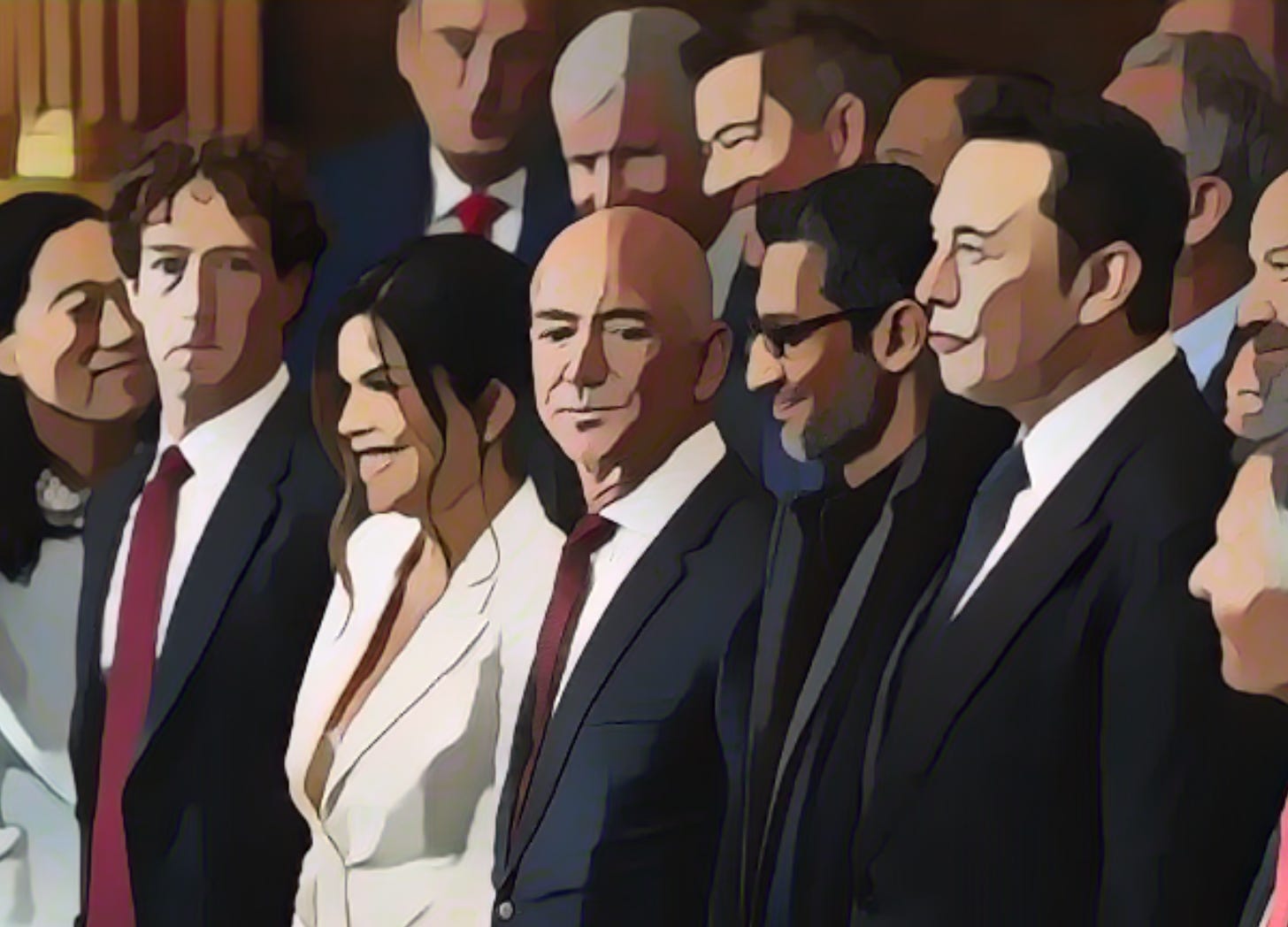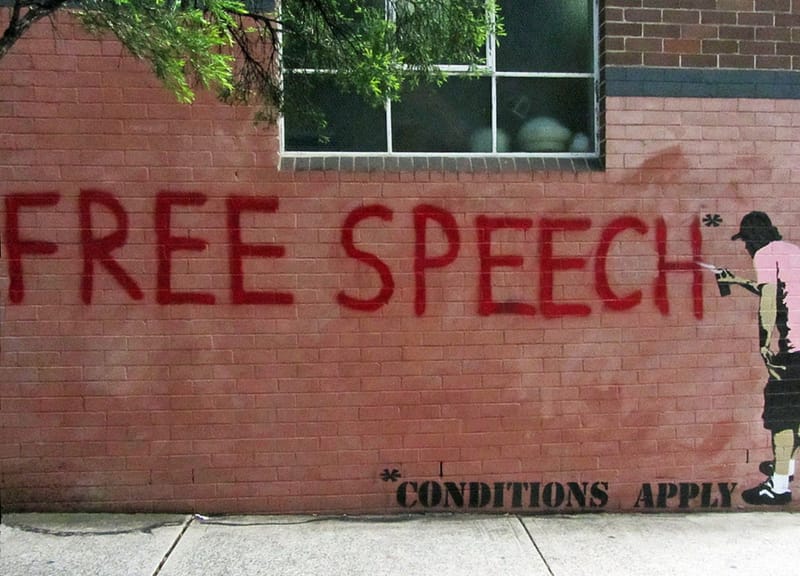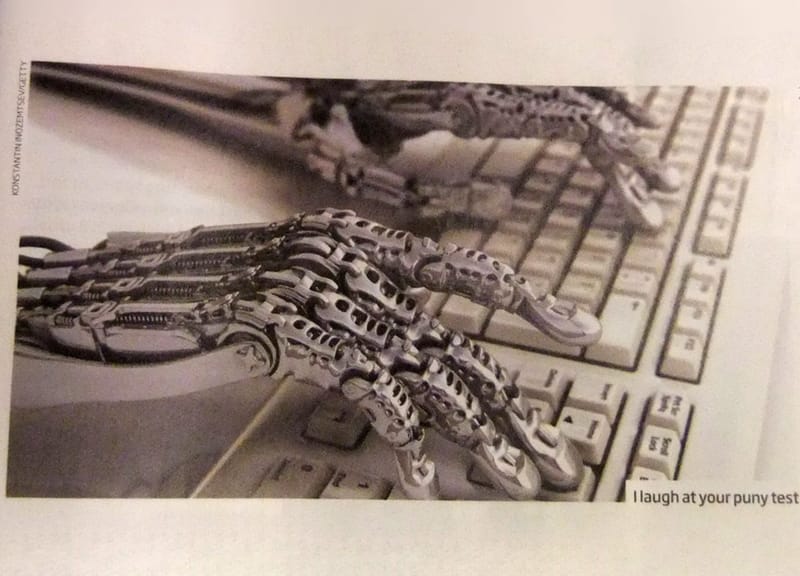Our world and its postmodern makeover
How we lost touch with value—and values

On the week of Trump’s inauguration, I have a lot of thoughts looping around my head about myth, language, political identity and impotence. I hope you’ll be patient with me as I try to work them out.
Last week’s newsletter was about how fascism never left us, as fascistic policies of consumption, transformation and control of nature (as a resource) have been the bedrock of both the Left and Right governments around the world for hundreds of years. The reason we don’t think of it as such is because fascism is inherently anthropocentric, centralised around ethno-centrism and nation-centrism. Falling prey to its own framework, we simply forgot to define fascism as able to victimise all living bodies rather than just human bodies.
I am fascinated by the gap between material reality and language, and think a huge reason as to why we’re in this global mess is because we fell into that gap and became a culture whereby we both disavow objective definitions and screech the necessity of bending the world to our linguistic vision. Both the mainstream Left and Right engage in post-truth-ism: the Right by engaging in the denial of objective fact and the Left by engaging in the denial of objectivity. Certainly, the philosophers who crafted postmodernism, the theory which pointed at the fact that most of what was considered to be “objective”, at least socially, was merely the perception and framework of the dominant group, did important work in pointing at power relations. But I think postmodernism also did us all a disservice. I think it created the conditions for neoliberalism and climate-denialism.
Postmodernism essentially argued that there are no grand narratives, that each person’s subjectivity holds a different perspective on the world. This is true to an extent. But while postmodernism shifted our perspectives on what constitutes truth, it failed to dismantle power, resulting in a world in which rather than chorus together, society splintered into dissonant calls of “my truth”. Truths which, seemingly, are expected to undermine any collective sense of objectivity. When transmuted from hardcore French theory into mainstream politics, it served to underscore the individual’s right to speak, not our collective duty to listen. This only served the neoliberal paradigm in which everyone is at odds with everyone else to hoover up limited resources, and the state is expected to stay out of the way because the markets will handle it. It’s like we handed over our collective reasoning to said markets, forgetting that they are nothing more than a construct. There is a word for this in fancy theory: reification. Postmodernism, in its alleged bid to deconstruct material narratives, paved the way to reify concepts, thrusting us all into a world of words where definitions are less important than what we feel about them.
There’s a wonderful clip of Noam Chomsky where, when asked what he thought of postmodernism, he sagely responded by suggesting we think critically about why it has ben allowed to propagate on campuses in the Western world; that it must, in some way, serve power. I have to agree, and also think that the French theorists weren’t that interested in dismantling power, given how much they abused their own. What I find utterly fascinating is that in the decade following the peak of postmodern thinking, Nixon abruptly delinked the US Dollar from the gold, essentially untethering the currency from material reality. The Dollar became a representation of American value rather than hard currency, linked to a concept, an idea, rather than anything substantial. The Dollar got a postmodern makeover.
I firmly believe only an untethered world could see value inflate in the way it has since. Only a dematerialised currency could balloon like this; only a digitised monetary currency could cope with pretending that individuals are worth hundreds of billions of dollars; and, certainly, only money backed by the concept of value could allow for a world in which moronic clowns could double their billions in a period of weeks without doing anything materially different (Elon Musk’s wealth has doubled to 220-odd billion dollars since Trump’s re-election)—which takes us nicely on to myth and identity.
Writing about political identities is incredibly tense thanks to the homogenising force of discourse on the Left. Rather than celebrate pluralities and questions, we seem to have entered into a Twilight Zone where ally-ship becomes loyalty and voices become scripted. In fairness, I can understand why: language is simultaneously the lowest-hanging and most powerful fruit. Controlling the means of communication is a formidable weapon in any autocrat’s regime, and, battered by the failure of the Cold War and the march Right by the parties which are meant to represent us, the one thing the Left can still fight for effectively is language. But we have to consider what that culture war has perpetuated: dematerialising the Overton window, validating right-wing tactics of dismissing objective science, and alienating large groups who have questions. In many respects, we’ve fallen prey to how the Right’s attempt to distract us with ignoble “debates” while dismissing the desperate reality many people are still fighting to survive in.
Now, a note: this is not to dismiss the critical work of many theorists and activists and organisers who are painstakingly trying to make room, linguistically and materially, for marginalised groups whose under-representation has resulted in their abuse and extermination; political identities do hold material weight. Rather, this is about how theory becomes lost in translation when applied only to the Self, as if everything ever produced has its utmost value in how it can be put to use for me. This, sadly, is how I see the current mainstream movement on the left, an entitled demand for the world to be remade by the words I use, and for everyone to fall in line to respect them, rather than a considered application of how to remake the world in the benefit for the many.
Language has become totally bastardised in the bid for identity, undermining much of the theory and struggle which paved the way for the conversation to even take place. Take gender: I studied gender and queer theory at university and wince every time someone claims that “male” and “female” are gender categories, when theorists battled for “man” and “woman” to be understood as gender categories and separate to sex, in order to liberate both women and marginalised gender identities. Claiming that sex can be changed according to which words we use is an ungrounded misunderstanding of the very thing which sought to liberate us all. It cleaves reality from language rather than using language to reveal how culture is a very real force in the world. And losing the threads of thoughts which brought us here means we become dispersed, like kites in the wind, forgetting there is an earth below where we can find common ground.
Objectivity is real. It’s both hard science and the plural world we weave together with words. But as the culture war has fragmented into a fight to define words, the Right has taken advantage of our willingness to abandon materiality to gain power, creating myths full of lies around men like Trump and Musk, and dismissing scientific certainties as if they are mere opinions. If I am what I am because I say I am, then those men are what they are because they say they are. And now they have power, and their first acts have been to materially attack trans-identities and women’s reproductive rights. Why? Because a plural world is a dangerous one, one in which their power is fragmented rather than our voices. And while our calls may seem discordant, common ground is only a step away. They want to dismantle our power before we find it.
Going forward, the fight cannot just be linguistic. It has to be material, relationship-building and grounded. It has to be connected to the many, not just to the self, and has to reveal the world for what it is, not cast spells to make it as we wish it were. It has to be a fight which goes beyond individual identity and “my truth” subjectivities, and towards cohesion, community, and a plurality which weaves together many worlds. Fascist rhetoric demarcates us as groups, and attributes a value. Much of postmodern discourse has become a confused identifier of individuals and concepts. We’re heading in the wrong direction. We need to find ourselves in groups, and then find how those groups fit with one another. Until we do that, we are kites in the wind, lost without the ties that bind us.
Planet: Critical investigates why the world is in crisis. If you have the means, support the project with a paid subscription today.



